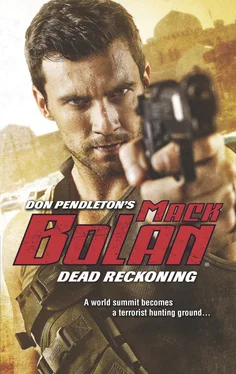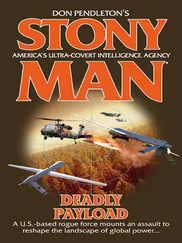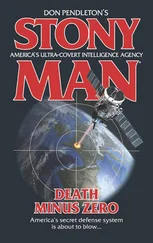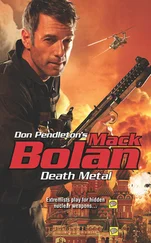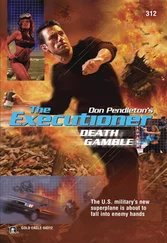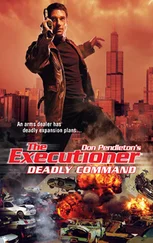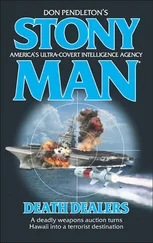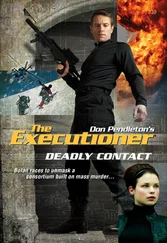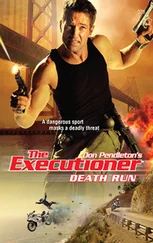There was a chance, he understood, that they might kill him. Hezbollah was ruthless with its enemies, and he might qualify as one if they believed he was responsible for the attack on Calle Victor Hugo Norte, costing them that property and any men who had been killed or nabbed by the police because of it. They risked the wrath of God’s Hammer if they executed him, but Hezbollah was vastly larger than his own small group of fighters, famous globally for decades, and they feared no one.
His only hope, Khamis believed, was to play stupid, claim that he had no idea the raiders could have come for him and his compatriots specifically. The more he thought about it, Khamis almost managed to convince himself. Who could have traced their path to Paraguay and mounted an attack there, after all?
A phone rang in the dining room. One of the Hezbollah fighters answered, listened and answered in Spanish. Khamis had no clue what he had said, but when the call was ended, his interrogators whispered urgently among themselves, glancing frequently in his direction, then approached him as a group, their faces dour.
“Your friends are dead,” their spokesman told him bluntly.
“Both of them?” Khamis thought he could feel the planet tilting underneath him.
“Both. Shot down a mile apart. You separated?”
“To escape,” Khamis acknowledged. “Yes.”
“And you alone survived.” There was suspicion in the man’s gruff tone.
“If you say so.” A shameful tremor shook his voice. He had been disarmed upon arrival and felt vulnerable now, an easy target.
“We have had no trouble at the safe house for the past eight years,” his interrogator said. “You arrived mere days ago, and now we have a dozen soldiers dead, police demanding answers. It’s peculiar, you’d agree.”
“I would not,” Khamis answered. “You’re all fugitives from the Israelis and Crusaders, just as I am. Who’s to say they did not come for you, over the rockets that you send from Gaza?”
His hosts—captors?—exchanged dubious glances, two of them shaking their heads. Their mouthpiece said, “The timing is suggestive. We have no faith in coincidence.”
Khamis stiffened his spine and squared his shoulders. It was time to bluff, he thought. What did he have to lose?
“All right,” he said. “If you believe I am responsible for this somehow, then I shall leave you. Give my weapons back, and you will see no more of me. Whatever happens next, find someone else to blame.”
The Hezbollah man smiled at that, a hungry jackal’s smile.
“It’s not so easy,” he replied. “Before we rid ourselves of you, we must decide whether you are, in fact, responsible for this attack. If someone wants you, it may be to our advantage to accommodate them. Possibly, we might receive some compensation for our losses.”
Praying that they could not see him trembling, Khamis said, “So, you would ransom me? A soldier of the same cause you avow? I thought the men of Hezbollah were freedom fighters, not a pack of gangsters.”
“You’d be wise to say no more,” the leader warned him. “Even if we sell you, there’s no reason why we shouldn’t take a few fingers and toes.”
* * *
BOLAN AND GRIMALDI chowed down at an American fast-food restaurant, a familiar stop these days no matter where on Earth you were. Over hamburgers and fries with coffee, Bolan gutted Rajhid’s wallet, while Grimaldi did the same with one he’d lifted from Salman Farsoun. Walid Khamis was in the wind.
Between the two of them, the fallen God’s Hammer members had been carrying a hundred and fifty thousand Paraguayan guaranís—some thirty-five US dollars—in cash, two bogus passports and a notebook, Farsoun’s, filled with Arabic notations Bolan couldn’t translate. He set the currency aside, secured the notebook in his pocket and placed the other items on the empty seat beside him, where he planned to leave them when they left the restaurant.
That left the telephones, two cells and Rajhid’s satellite phone. Each of them took a cell phone first, scrolling through their memories in search of any recent numbers called by either of the two dead terrorists.
“Nothing on this the past ten days,” Grimaldi said.
“I’ve got one local call,” Bolan replied. “Prefix sixty-one. Rajhid called it three days ago.”
“Around the time they’d have checked into Hezbollah Arms,” Grimaldi stated.
“We can try for an address from Stony Man,” Bolan suggested, reaching for the small sat phone. Three calls had been logged in memory and not erased, a bonehead move. He set the phone beside Grimaldi’s plastic food tray. “Do the numbers ring a bell?”
The Stony Man pilot studied them. “The 249 is a country code, so forty-one is the city and the rest a local number. Off the top, I couldn’t tell you where it is. Sorry.”
Bolan got out his smartphone, thankful that the restaurant offered free Wi-Fi. He went online to check the foreign phone codes, found what he was looking fo, and told Grimaldi, “Two forty-nine is Sudan. The city code’s Kassala.”
“Never heard of it.”
“More homework for the Farm. I’ll send the numbers through.”
He switched to email on the smartphone, typed an address that would eventually allow the message to reach Stony Man Farm in Virginia without pinpointing his or Stony Man’s location and sent two phone numbers with a request for a speedy response. It was a relatively easy job for Aaron Kurtzman’s cyber-team, hopefully landing some pointers for Bolan within the half hour.
“When we get the local number—” Grimaldi began.
“We check it out.”
“Hoping Khamis is there, assuming that he even knows where there is.”
“Hoping,” Bolan granted. “If he’s not around, smart money says we’ll find another Hezbollah hangout.”
“Small favors.” Grimaldi was working on his last few fries. He washed them down with coffee, pushing back his tray. “Ready when you are, kemo sabe .”
Zermatt, Switzerland
SALEH KABEER WAS dining when Mohammed Sanea interrupted, bringing him a sat phone.
“My apologies,” Sanea said. “A call from Paraguay.”
Kabeer frowned at his second in command. “Rajhid?”
Sanea shook his head. “One of the Hezbollah men. Ashraf Tannous, he says.”
The frown became a scowl. Kabeer set down his fork and took the phone, waving Sanea toward the nearest exit from the dining room.
“Greetings.”
“And greeting be unto you,” the caller replied. “I hope I have not reached you at an inconvenient time.”
Kabeer glanced at his cooling dinner, likely ruined by the interruption. “Not at all,” he lied.
“We have a problem,” the man said. “Is this line secure?”
“It is, if you are.”
“Very good. I’m sorry to report that there has been...an incident.”
“Explain.” Kabeer was not the most patient of men, nor the most courteous.
“Crusaders have attacked a safe house here. It’s possible they came for your men.”
“Possible?”
The caller’s shrug was nearly audible. “Your three fled from the building. They were followed. Two of them are dead now.”
“Followed.” He was sounding like an echo chamber. “Do you mean pursued ?”
“It seems so.”
“You say two are dead,” Kabeer stated.
“We have the third one here, Walid Khamis. He claims it was coincidence.”
“You disagree?”
“The evidence—” the caller began.
“I understand. Is he available to speak with me?”
“One moment.”
It took longer, but Kabeer tried not to grind his teeth. When Khamis came on the line at last, his tone was cautious, worried.
“Sir, have they explained what happened?”
Читать дальше
